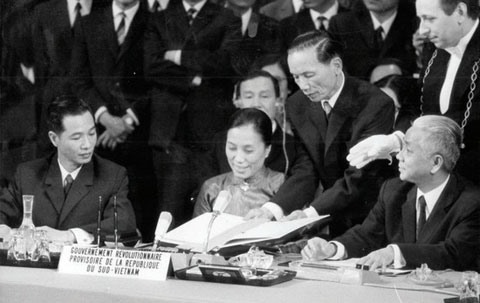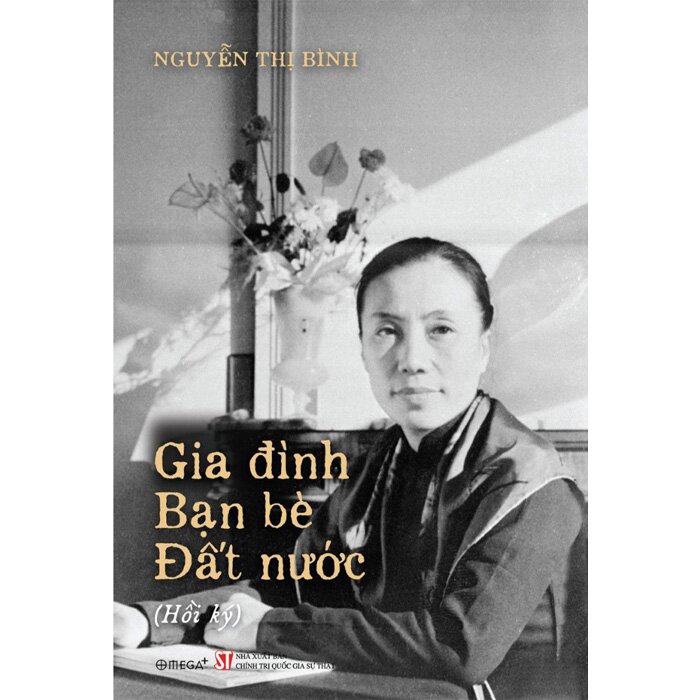In contrast to the complexity and noise, on social networking platforms these days, a particularly popular keyword has been spread, searching widely with articles expressing admiration and pride, which is the keyword about Madame Binh (Ms. Nguyen Thi Binh) on the negotiation table in Paris from 1968 to 1973.
On social networking platforms, the image of Madame Binh being polite, soft and tough, cold at the negotiation table caused strong emotions. The small, beautiful and polite Vietnamese woman confidently stood in front of the international press answering in many languages, calling on public opinion around the world to support the end of the war in Vietnam.
In the context of the country moving towards the 50th anniversary of the country's reunification, the image of "Madame Binh" spread with strong inspiration.
The negotiation changes history
Ms. Nguyen Thi Binh was born in 1927, birth name is Nguyen Thi Chau Sa. Ms. Nguyen Thi Binh, former Vice President of the Socialist Republic of Vietnam, was the Minister of Education and the first Minister of Foreign Affairs of Vietnam.
From 1968 to 1973, Ms. Nguyen Thi Binh was the head of the Delegation of the National Front of South Vietnam, then the Provisional Revolutionary Government of the Republic of South Vietnam participated in the 4 -party conference on the end of the war, restoring peace for Vietnam in Paris.
In her memoir Family, friends and country, former Vice President Nguyen Thi Binh wrote long chapters about her nearly 5-year journey with the two diplomatic delegations of the National Liberation Front of South Vietnam and the Democratic Republic of Vietnam in Paris (France) pursuing the goal of asking the US to decline the level of war, towards signing the Paris Agreement.
For the Paris Agreement to be signed on the historic 27/1/1973, for nearly 5 years it was a "both fighting and negotiating" combination, a tense and complicated struggle between us and the US on all three political, military and diplomatic fronts.

After the general attack and revolt of the Vietnamese army and people in 1968, the United States and its minions realized that they were no longer able to win a nationally fighting nation to the end for independence, freedom and reunification of the country. The United States was forced to take into account the war before bogged down, a political solution will help the United States withdraw from this hopeless war.
The Paris negotiations are considered a diplomatic front full of difficulties and challenges. In her memoir, Ms. Nguyen Thi Binh wrote that when she arrived in Paris to participate in the negotiations, "we told each other to have a decent and smiling attitude as comrade Xuan Thuy (head of the diplomatic delegation of the Government of the Democratic Republic of Vietnam) said. That day, I wore a dark pink ao dai, gray bottle of bamboo shoots with a black scarf with flower points"...
The feminism but determination of Ms. Nguyen Thi Binh was once likened to a woman "dancing among the Wolves" during the trial around the wedding table in Paris against the attacks of the US and Saigon authorities.
Also in nearly 5 years of negotiations, to gain an advantage on the diplomatic front, the US has conducted a series of sweeping operations, launching fierce attacks on the battlefield.
According to the memoir "Family, friends and country", from 1970 to 1972, the diplomatic and military front entered a determined recovery, the fierce the battlefield was, the tense the diplomatic front.
“The Ho Chi Minh trail was shot 24/24 hours a day. The ports in the North were surrounded by the mines. In March 1972, our people started a major attack in the Southeast, the Central Highlands and Quang Tri - Thua Thien Hue. The campaign in Quang Tri lasted until September 1972 was one of the most fierce campaigns in the Vietnam War are very young.
When I signed the Paris Agreement, I was very moved
The brave battles of our army and people on the battlefield, from Road 9 South Laos, Quang Tri ancient citadel to the B52 bombing of the US on Hanoi... it was the strength, fighting spirit and readiness to sacrifice that gave the delegation to negotiate on the diplomatic front.

Ms. Nguyen Thi Binh wrote that each negotiation is a brain-wrenching battle between us and the US. Amid the mud of the US, our diplomatic mission has responded to thousands of international articles, participated in meetings with countries around the world, to promote international public opinion to side with Vietnam, support peace, and opposite the US.
So on January 27, 1973, when they could not have an advantage on the battlefield, the US had to go down the scale, sign the historic Paris Agreement, commit to withdraw troops, end the war, and restore peace for Vietnam.
Former Vice President Nguyen Thi Binh wrote: Signing the historic Paris Agreement, I am deeply moved, thinking about compatriots, comrades, and friends in both the North and the South... When I remember those who are no longer here to know about this event, I cry.











